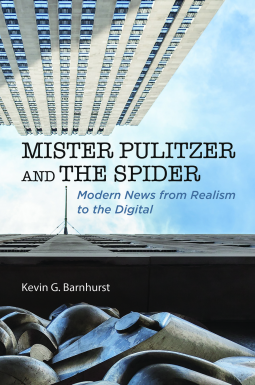
Mister Pulitzer and the Spider
Modern News from Realism to the Digital
by Kevin G Barnhurst
This title was previously available on NetGalley and is now archived.
Buy on Amazon
Buy on BN.com
Buy on Bookshop.org
*This page contains affiliate links, so we may earn a small commission when you make a purchase through links on our site at no additional cost to you.
Send NetGalley books directly to your Kindle or Kindle app
1
To read on a Kindle or Kindle app, please add kindle@netgalley.com as an approved email address to receive files in your Amazon account. Click here for step-by-step instructions.
2
Also find your Kindle email address within your Amazon account, and enter it here.
Pub Date Jul 13 2016 | Archive Date Jul 26 2016
Description
A spidery network of mobile online media has supposedly changed people, places, time, and their meanings. A prime case is the news. Digital webs seem to have trapped "legacy media," killing off newspapers and journalists' jobs. Did news businesses and careers fall prey to the digital "Spider"?
To solve the mystery, Kevin Barnhurst spent thirty years studying news going back to the realism of the 1800s. The usual suspects--technology, business competition, and the pursuit of scoops--are only partly to blame for the fate of news. The main culprit is modernism from the "Mister Pulitzer" era, which transformed news into an ideology called "journalism." News is no longer what audiences or experts imagine. Stories have grown much longer over the past century and now include fewer events, locations, and human beings. Background and context rule instead.
News producers adopted modernism to explain the world without recognizing how modernist ideas influence the knowledge they produce. When webs of networked connectivity sparked a resurgence in realist stories, legacy news stuck to big-picture analysis that can alienate audience members accustomed to digital briefs.
To solve the mystery, Kevin Barnhurst spent thirty years studying news going back to the realism of the 1800s. The usual suspects--technology, business competition, and the pursuit of scoops--are only partly to blame for the fate of news. The main culprit is modernism from the "Mister Pulitzer" era, which transformed news into an ideology called "journalism." News is no longer what audiences or experts imagine. Stories have grown much longer over the past century and now include fewer events, locations, and human beings. Background and context rule instead.
News producers adopted modernism to explain the world without recognizing how modernist ideas influence the knowledge they produce. When webs of networked connectivity sparked a resurgence in realist stories, legacy news stuck to big-picture analysis that can alienate audience members accustomed to digital briefs.
Advance Praise
"Everyone has a theory about what's gone wrong with the news business. Kevin Barnhurst's explanation is original, elegantly presented, and potentially useful both to journalists and to citizens trying to decide which version of the news is worth paying attention to."--James Fallows, author of Breaking the News: How the Media Undermine American Democracy
"With unparalleled scholarly precision spanning more than 200 years, Kevin Barnhurst chronicles the tumultuous evolution and revolution of news--how it's created and consumed. Through his panoramic lens, Barnhurst reveals a macro and micro focus on why today's newspapers are thinner, broadcast sound-bites shorter, and news often skeletal on the facts, the result of technology developing shorter attention spans. Spoiler alert, Mister Pulitzer and the Spider leaves us with a glimmer of hope."--Roberta Baskin, award-winning investigative journalist
"Over the years, I've found few scholars whose work is as original, insightful, or readable as Kevin Barnhurst's. Mister Pulitzer and the Spider exceeds even that lofty expectation. Barnhurst's story of how the hierarchy and meaning of reporters' five Ws have changed since the late 1800s explains more fully how the news has shaped society, and been shaped by it, than any book I've read. If your nightstand, classroom, or personal library has room for only one book on journalism, make it this one."--Thomas E. Patterson, author of Informing the News: The Need for Knowledge-Based Journalism
"With unparalleled scholarly precision spanning more than 200 years, Kevin Barnhurst chronicles the tumultuous evolution and revolution of news--how it's created and consumed. Through his panoramic lens, Barnhurst reveals a macro and micro focus on why today's newspapers are thinner, broadcast sound-bites shorter, and news often skeletal on the facts, the result of technology developing shorter attention spans. Spoiler alert, Mister Pulitzer and the Spider leaves us with a glimmer of hope."--Roberta Baskin, award-winning investigative journalist
"Over the years, I've found few scholars whose work is as original, insightful, or readable as Kevin Barnhurst's. Mister Pulitzer and the Spider exceeds even that lofty expectation. Barnhurst's story of how the hierarchy and meaning of reporters' five Ws have changed since the late 1800s explains more fully how the news has shaped society, and been shaped by it, than any book I've read. If your nightstand, classroom, or personal library has room for only one book on journalism, make it this one."--Thomas E. Patterson, author of Informing the News: The Need for Knowledge-Based Journalism
Available Editions
| EDITION | Other Format |
| ISBN | 9780252040184 |
| PRICE | $34.95 (USD) |
Links
Readers who liked this book also liked:
You Have a New Memory
Aiden Arata
Biographies & Memoirs, Computers & Technology, Essays & Collections
Aiden Arata
Biographies & Memoirs, Computers & Technology, Essays & Collections






